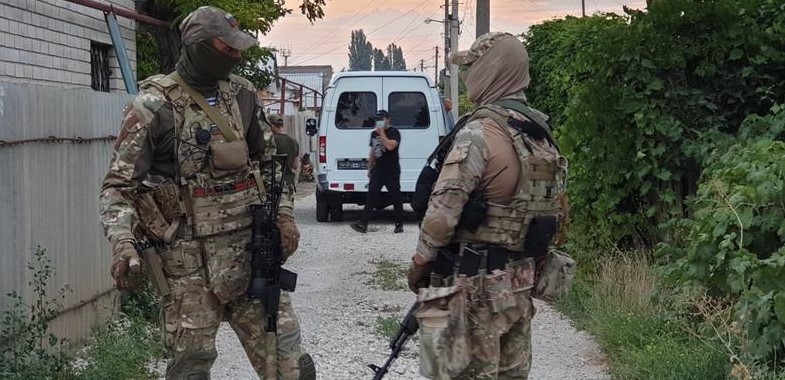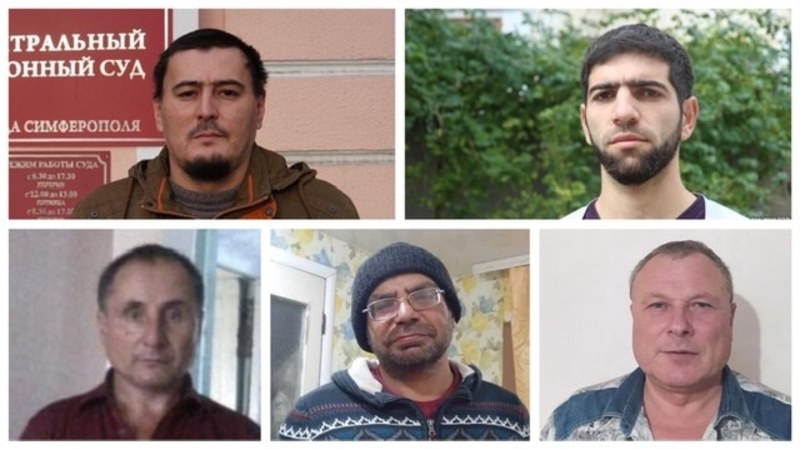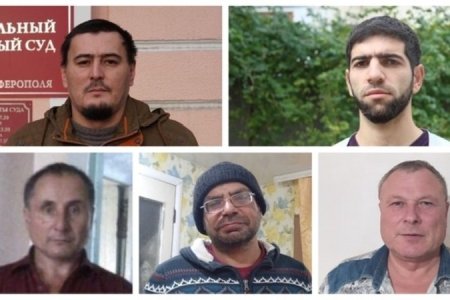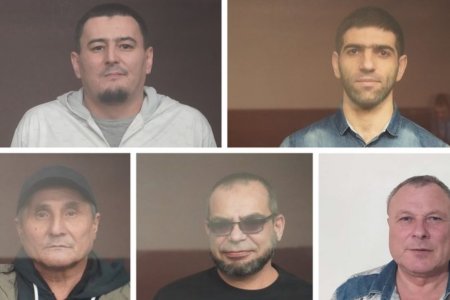
A Russian court has passed the quickest and shortest sentence against a Crimean Tatar on spurious ‘terrorism’ charges since Russia invaded and annexed Crimea in 2014. The ‘trial’ of Murat Mustafayev only eight months after his arrest and his four-year sentence do not show a new more humane side of Russia’s ‘justice system’. The truth is much more cynical and very brutal.
Nine months after Russia’s invasion, the FSB carried out the first of many armed searches and arrests of Crimean Tatar and other Ukrainian Muslims accused only of involvement in the peaceful transnational Hizb ut-Tahrir organization which is legal in Ukraine. The gravely flawed charges, under Russia’s ‘terrorism’ legislation were based solely on a highly secretive and unexplained ruling by Russia’s Supreme Court in February 2003. This declared the organization ‘terrorist’, although there was no evidence then, nor has any emerged since, of members of Hizb ut-Tahrir having committed acts of terrorism anywhere in the world. It is likely that the FSB assumed that charges laid under ‘terrorism’ legislation would not arouse too much scrutiny, and for over a year this was, unfortunately, the case.
Moscow may well have been testing international reaction to Russia’s illegal application of profoundly flawed charges in occupied Crimea and the first sentences passed by the Southern District Military Court in Rostov in September 2016 were lower than those demanded by the Russian prosecutor. Ferat Saifullaev; Rustem Vaitov and Nuri Primov, who were charged under Article 205.5 § 2 of Russia’s criminal code with involvement in ‘a terrorist organization’ (as Hizb ut-Tahrir was claimed to be), all received the minimum 5-year sentence (rather than the 7 or 8 years demanded). The court also reduced the charge against Ruslan Zeitullaev from ‘organizing’ a Hizb ut-Tahrir group (Article 205.5 § 1) to ‘involvement’ in it, and sentenced him to 7 years. The FSB need at least ‘one organizer’ for their paperwork, and Zeitullaev’s sentence was challenged until another panel of judges at the same court provided a 15-year sentence. The other three were not challenged, and the men were released after serving them to the full.
From 2016, the armed arrests began coming quick and fast, with many of the victims, including human rights defender Emir-Usein Kuku, almost certainly targeted because they refused to collaborate with the FSB. It was with the Yalta group of six Ukrainian Muslims, including Kuku, that Russia came up with the extraordinary additional charge (under Article 278) of ‘planning to violently overthrow the Russian constitutional order’. The renowned Memorial Human Rights Centre, which considers all those imprisoned solely on charges of involvement in Hizb ut-Tahrir to be political prisoners, has pointed out that the arguments for this charge are a repeat of those cited to justify the charges under Article 205.5. It earlier noted that, in Russia, the extra charge tended to be laid, or not, depending on whether the person arrested agreed to ‘cooperate’ with the investigators. At a minimum, such ‘cooperation’ means fully accepting the insane charges, however, the FSB or prosecutor probably also demand that the person provides ‘testimony’ against others. Up till now, the Crimean Tatar and other Ukrainian Muslims arrested have consistently rejected the charges and any such forms of ‘cooperation’. We know in several cases that the charges were made more serious (from ‘involvement’ to ‘organizer’) because the political prisoners refused to give false testimony or to keep silent about the torture they had endured.
By 2017, the FSB had begun clearly targeting civic journalists and activists, especially those involved in the vital Crimean Solidarity human rights movement. The sentences, all passed by the same Southern District Military Court in Rostov (Russia) have been getting longer and longer, with men sentenced, without any recognizable crime and, largely on the basis of ‘secret witnesses’, to 19 years or longer in the very harshest of Russian penal institutions.
After the last wave of arrests on 24 January 2023, 101 Ukrainian citizens, most of them Crimean Tatar, had been arrested and charged in occupied Crimea, with involvement in Hizb ut-Tahrir. Their persecution has been condemned and their release demanded by the UN General Assembly and other international bodies, by human rights NGOs and by most democratic states.
Murat Mustafayev
CrimeaSOS reports that on 19 April 2023, the Southern District Military Court sentenced Murat Mustafayev to four years’ imprisonment for supposed involvement in Hizb ut-Tahrir. This was by the far the quickest ‘trial’ to date and the shortest sentence on ‘Hizb ut-Tahrir’ charges against a Ukrainian citizen in occupied Crimea.
According to the information available, Mustafayev is alleged to have become a member of Hizb ut-Tahrir in 2015. The ‘justification’ for the sentence, which is around 8 years lower than what ‘judges’ from the same court are handing down would seem to be that the FSB said that he had ‘admitted his guilt’. The case was therefore examined separately, and frustratingly little is known about it. The FSB are notorious for putting pressure on the detainees in such cases to reject the services of renowned human rights lawyers like Emil Kurbedinov, Edem Semedlyaev and others. The reasons are clear since, even if the verdicts in these politically motivated ‘trials’ are predetermined, the independent lawyers make sure that the men receive proper defence and that the fabricated nature of the charges and supposed ‘evidence’ is publicly known.

Mustayev was one of six Crimean Tatars who were arrested after armed searches of many homes in Dzhankoy and the Dzhankoy region on 11 August 2022. The FSB have, from the beginning, prevented lawyers from being present at these ‘searches’, during which they make no pretence of looking for anything except so-called ‘prohibited religious literature; and frequently plant such books themselves, then claim to have found them. This time, however, Emil Kurbedinov reported that he had even been prevented from reaching the men’s homes as his mobile telephone connection had been cut. This, he noted, was a clearly targeted action, with the phones of several other lawyers also disconnected.
The men targeted included Vilen Temerianov (b. 1985), a Crimean Solidarity civic journalist who had previously faced detention and administrative prosecution (fines and administrative arrest) for totally peaceful civic activism. The same is true of civic activist, Enver Krosh (b. 1991). They are now facing huge terms of imprisonment, together with 66-year-old Seitiye Abbozov (b. March 1957) Rinat Aliev (b. 1964) and Edem Bekirov (b. 1976). Enver Krosh faces the more serious ‘organizer’ charge (under Article 205.5 § 1) with this currently resulting in sentences of 17-19 years. The other four men are accused of ‘involvement’ in a fictitious Hizb ut-Tahrir ‘cell’.
The ‘case’ against them has already been sent to the Southern District Military Court with the ‘trial’ now pending.



